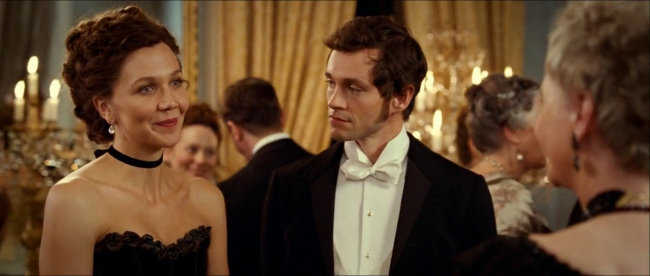
For centuries, a wide variety of mental conditions exhibited by women were diagnosed as "hysteria". In the notoriously sexually repressive Victorian era, women diagnosed with hysteria were treated with "genital massages" to induce "paroxysms"--orgasms--by physicians. What a perfect subject for a romantic comedy, or so evidently thought director Tanya Wexler when she decided to make her 2011 film Hysteria. It is a charming, lightweight film with entertaining performances spoiled only when one now and then contemplates how different the reality must have been.
The film achieves its light tone by doggedly sticking to a very narrow focus and comes across more as a celebration of female sexuality and liberation by modern women in costume than it does a depiction of this long standing misconception in human history.

Hugh Dancy plays a young doctor named Mortimer who's fired from every hospital in London for insisting on the existence of germs and therefore on taking proper precautions against them when treating patients. He's finally accepted to a position at the practice of Dr. Dalrymple, played by Jonathan Pryce, who portrays this suggestively named specialist in treating hysteria completely straight with the naivete that can only come with complete confidence in his knowledge of the ways of the world.

His waiting room is always packed with women of all ages eager for orgasm so it's a good thing Mortimer's there to lighten the workload. Maggie Gyllenhall plays Dalrymple's rebellious daughter, Charlotte, who miraculously seems not to bear any single misconception of her time and loudly denounces the phoney theory of hysteria and stomps off to care for the poor. Of course, Mortimer's flatmate, the Rupert Everett-ish Lord Edmund St. John-Smythe played by Rupert Everett, immediately takes a shine to her.

What happened to Rupert Everett's face? He used to have sharp, chiselled cheekbones but he's gone all puffy. Has he had a face transplant? Anyway, this is his triumphant return to the best friend role that made his name in a variety of romantic comedies, though he's usually the best friend of the female lead.

Although Charlotte disapproves of medical talent being wasted on "bored housewives" when the doctors could be helping the sick and injured among the poor she cares for she nonetheless calls the treatments a "bargain" considering the pleasure they give to the patients. Considering her feistiness and her familiarity with the nature of the treatment, one would think an obvious question would be whether or not her father has ever treated her. The movie totally avoids this question. Thinking of it, though, as I can't imagine anyone watching the movie could avoid, leads us down a path of other questions the movie avoids. Like, if hysteria is a diagnosis for an absurdly wide variety of mental conditions, and women are under the control of there husbands, there must therefore be women suffering from conditions like anxiety and bipolar disorder unrelated to unfulfilled sexual needs who are being forced by their husbands to visit physicians who molest them. I'm not a doctor but I can imagine this doing a lot more harm than good.

Even for the women who are visiting to fulfil sexual needs, it surely must provoke something of a crisis for a devoted Victorian housewife to learn, as the movie can't help from revealing to them at the end, they're engaging in activities that aren't really different from their husbands visiting prostitutes. But the film never addresses this. Its attitude, in this respect, seems rather flippant and at least as naive as Dr. Dalrymple. But like Dalrymple, it does have real charm, so long as one doesn't think too deeply.

No comments:
Post a Comment